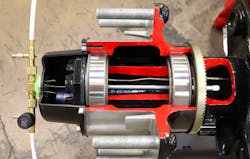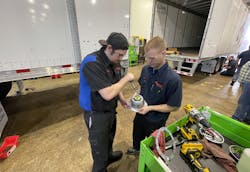SAN ANTONIO, Texas—According to leaders at Pressure Systems International (P.S.I.), more than three out of every four new trailers gets spec’d with an automatic tire inflation system (ATIS). Meritor Tire Inflation System (MTIS) by P.S.I. already accounts for two-thirds of those, the leaders estimated at the 2023 Fleet Tech Event hosted by P.S.I. and Cummins-Meritor Nov. 15-16, but they want more.
And they have a good chance to get it. European legislation will require all trailers manufactured after July 2024 must have ATIS or tire pressure monitoring systems (TPMS). In the states, fleets are also continuing to retrofit trailers with MTIS, seeking to benefit from increased tire life, better fuel economy, and a reduction in roadside breakdown risk.
“The Meritor system seems a lot simpler when it comes to replacing parts,” explained Joe Blankenship, FMC Transport fleet operations manager, who noted the fleet will "likely start running" MTIS, of which 2 million units have been sold.
FMC, a Coastal Energy company, is an asphalt distributor for plants in Miller and Willow Springs, Missouri, and Clinton, Oklahoma. Its fleet includes 60 trucks and over 200 tank trailers, including Etnyre trailers for asphalt; Heil and Polar Tank trailers for gasoline, diesel, ethanol, and biodiesel; and Countryside and Westmor Industries units for propane, most of which are equipped with a competitor’s tire inflation system that sometimes starts leaking air through the axles.
“The downfall is our technicians are taking the units off instead of trying to repair them because we really don’t understand how to repair them in the axle,” Blankenship explained.
The MTIS system consists of a control box, air lines and fittings, axle “press plugs” with ThermAlert eutectic screws, “stator” tubes, rotary union “thru-tees,” tire hoses, available “check port” hoses for easy gauge access, and a driver warning light. The system sends pressurized air from a trailer’s air tank into the control box, where it’s filtered and regulated, then routed through the hollow axle, rotary union, and hoses into the tire.
Blankenship indicated he most appreciated the system’s tracking capabilities and data generation, allowing his team to recognize patterns and adjust accordingly. “For the most part, our drivers do a good job, but at the end of the day, humans aren’t perfect, so we do have issues with tires running low or even flat.
“That’s why tire inflation systems are crucial.”
“We’ll probably do some retrofits to see how it works and go from there, and maybe start spec’ing the system on new tank trailers in the future. It has a lot more to offer than what we’re currently using.”
Those offerings include visual tire pressure and wheel-end alerts, integrated telematics that enable predictive maintenance, and, starting in April 2024, newly won guidelines in the Commercial Vehicle Safety Alliance’s North American Standard Out-of-Service Criteria handbook that will allow trucks with operable automatic tire inflation systems to avoid falling out of service—even when a tire has a noticeable leak.
“The tire will still be documented as a violation,” Wayne Skinner, Ozark Motor Lines vice president of fleet maintenance, noted enthusiastically. “However, this update will afford us the flexibility to repair the tire before the vehicle is re-dispatched—and will reduce the total CSA [Compliance, Safety, Accountability] score impact.”
“Updates like this encourage fleets to make investments and adopt technologies that are designed to make them safer and more efficient.”
Ozark Motor Lines, an all-Freightliner tractor and Hyundai Translead trailer fleet in the American Southeast, is also making plenty of updates. Skinner said MTIS is being added to all new trailer and they are retrofitting existing trailers.
Skinner secured ownership’s support for a P.S.I. retrofit program after sampling 320 trailer tires to see how many were under 80 psi, and how many duals were more than 5 psi apart, then extrapolating the data across the entire fleet.
“We realized we had several hundred tires that were underinflated, and several hundred with mismatched pressures in the dual positions,” Skinner said.
He estimates 72% of Ozark’s 2018 model-year and newer trailers now are retrofitted, leaving approximately 300 trailers to go. “If you start adopting new only, you face a decade-long problem of integrating that technology into the fleet,” Skinner asserted. “So, based on modeling, it made sense to go back five years, and then anything older we’ll phase out over the next several years, reducing our adoption to a five-year process.”
All new trucks are being spec’d with TPMS as well (with Bendix SmartTire). They expect 100% coverage in the next few years.
The fleet expects to circumvent future issues by connecting their TPMS with Detroit Connect Virtual Technician remote diagnostics system.
“When a tire pressure falls below our set value, Virtual Technician notifies our breakdown team, and then our breakdown team then contacts that driver in dispatch,” Skinner explained. The tire issue may be handled on the side of the road or closest terminal, depending on severity.
“Not only does the driver have visibility, but we also now have back-office visibility to the tires,” Skinner surmised.
Starting next year, Ozark vehicles with an ATIS that’s maintaining inflation pressure greater than 50% of the maximum psi on the sidewall of any truck or trailer tire—other than those on the power unit’s front steering axle—won’t be placed out of service thanks to a March issue request logged by Jim Sharkey, P.S.I. president, and accepted by CVSA’s board of directors. “If I do what the inspection bulletin tells me and check the air pressure, and it’s still above 50% of the sidewall pressure, you will not be placed out of service [after April 1, 2024],” Wirachowsky confirmed.
Ozark technicians are handling the installs at shop locations in Memphis; Springfield, Missouri; and Lebanon, Tennessee. Skinner said he had parts sourcing issues early before securing three supply chain channels to keep Ozark stocked. “We’ve got a min-max strategy where once we’ve installed ‘x’ number of units we place another bulk order with one of our suppliers,” he explained. P.S.I. worked with Ozark to modify its retrofit kits so they match its new-build MTIS systems. “We wanted new trailers coming equipped from the factory to look and act exactly like the retrofits, so there’s no distinction for drivers,” Skinner said.
Ozark also purchased new tools for each shop and provided ATIS kits that include project plans, installation workbooks, and quality control checklists. P.S.I. helped with training and Meritor provides aftermarket service and support. Steve Edie, Cummins-Meritor senior product manager, said Meritor has filled more than 45,000 MTIS component orders for nearly 1,800 consignees in 2023. “We help you by keeping products in stock, helping you specify, working with your sales team, and making sure your preferred distribution partners are taken care of,” he said.
A more in-depth look at P.S.I. and Cummins-Meritor's 2023 Fleet Tech Event can be found at BulkTransporter.com.
About the Author
Jason McDaniel
Jason McDaniel, based in the Houston, Texas, area, has nearly 20 years of experience as a journalist. He spent 15 writing and editing for daily newspapers, including the Houston Chronicle, and began covering the commercial vehicle industry in 2018. He was named editor of Bulk Transporter and Refrigerated Transporter magazines in July 2020.

